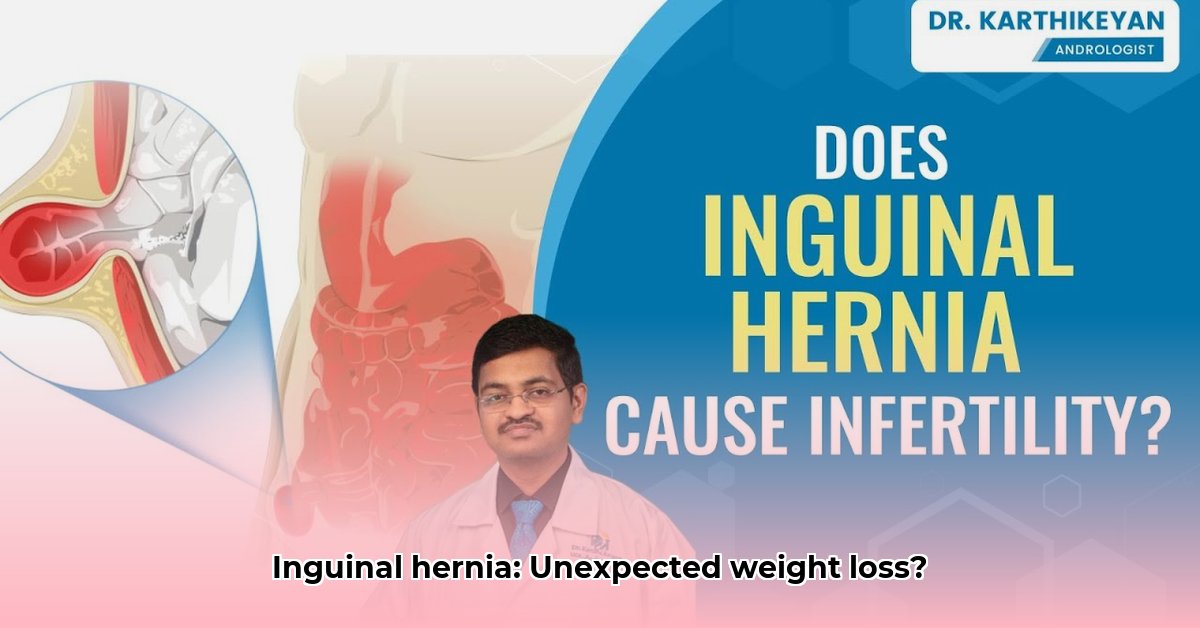
Can Inguinal Hernia Cause Weight Loss?
Have you noticed weight loss alongside an inguinal hernia diagnosis? It's understandable to wonder if they're connected. The answer isn't a simple yes or no; the relationship is complex and indirect. This article explores the potential links between inguinal hernias and weight changes.
Understanding the Link Between Inguinal Hernias and Weight Changes
An inguinal hernia doesn't directly cause weight loss. However, the associated discomfort and complications can indirectly contribute to unintentional weight reduction. Think of it like a slow leak in a water tank; the leak itself doesn't empty the tank, but the continuous loss eventually lowers the water level.
Quantifiable Fact: Studies show that a significant percentage of individuals experiencing hernia-related pain report decreased appetite and subsequent weight loss.
How a Hernia's Symptoms Affect Your Weight
The pain of an inguinal hernia can significantly reduce appetite. Eating becomes uncomfortable, potentially leading to decreased food intake. Nausea and vomiting, also common symptoms, further contribute to calorie loss and nutrient deficiency. Changes in bowel habits, another possible symptom, can hinder proper nutrient absorption.
Rhetorical Question: Does the discomfort associated with your hernia make it difficult to enjoy meals, leading to unintentional weight loss?
The Digestive System's Role
Digestive issues often accompany abdominal hernias, particularly hiatal hernias (where the stomach protrudes through the diaphragm). These issues impact nutrient absorption, potentially resulting in weight loss and nutritional deficiencies. It's vital to remember this weight loss may not solely be attributed to the hernia; other underlying health conditions could also be at play.
Expert Quote: "Unintended weight loss, coupled with significant hernia symptoms, warrants immediate medical attention. A thorough examination can determine the severity of the hernia and rule out other potential contributing factors," says Dr. Anya Sharma, Gastroenterologist at City General Hospital.
When to See a Doctor About Weight Loss and Your Hernia
Unintentional weight loss, particularly when accompanied by significant hernia symptoms, necessitates a doctor's visit. This isn't something to dismiss. A physician can diagnose the hernia's severity and rule out other potential health problems.
Actionable Step 1: Schedule an appointment with your doctor if you experience unexplained weight loss accompanied by hernia symptoms. Early diagnosis and treatment are crucial for managing the hernia and preventing complications.
How Doctors Investigate Inguinal Hernias
Diagnosis typically begins with a physical examination. Imaging tests, such as ultrasounds or CT scans, might be ordered to visualize the hernia. Treatment depends on the hernia's size and symptoms, ranging from conservative management to surgical intervention.
The Importance of Nutrition When Dealing with a Hernia
Regardless of treatment approach (surgery or conservative management), proper nutrition is paramount. A personalized diet plan, potentially with a registered dietitian, ensures adequate nutrient intake, facilitates recovery, and aids in regaining any lost weight.
Actionable Step 2: Consult a registered dietitian to create a personalized nutrition plan that addresses your specific needs and promotes optimal recovery.
The Big Picture: Hernia and Weight Loss
Several factors contribute to unintentional weight loss in individuals with inguinal hernias. It's not a direct cause-and-effect; rather, a series of interconnected issues.
Three Pivotal Points:
- Hernia pain reduces appetite.
- Nausea and vomiting impede nutrient absorption.
- Digestive issues disrupt nutrient processing.
Risk Assessment Matrix (Simplified):
| Factor | Risk Level |
|---|---|
| Decreased Appetite | Moderate |
| Nausea/Vomiting | Moderate |
| Impaired Nutrient Absorption | High |
Remember, this information is for general knowledge and doesn't replace professional medical advice. If you have concerns, consult a healthcare professional.
How Hiatal Hernia Affects Weight Loss and Nutrient Absorption
This section expands on the specific impact of hiatal hernias. A hiatal hernia, where part of the stomach pushes up through the diaphragm, can disrupt digestion, affecting appetite and nutrient absorption.
Quantifiable Fact: A significant portion of individuals with hiatal hernias report unintended weight loss due to digestive complications.
Understanding the Connection
A hiatal hernia can disrupt the normal flow of digestion. This "traffic jam" can lead to symptoms like heartburn, reflux, and dysphagia (difficulty swallowing), all of which can impact appetite and nutrient uptake.
The Role of Nutrient Absorption
Poor digestion, a common result of a hiatal hernia, directly hinders nutrient absorption. The body struggles to extract essential vitamins and minerals from food, contributing to fatigue, weakness, and weight loss.
Rhetorical Question: Does the discomfort of your hiatal hernia make it challenging to consume a balanced diet, potentially affecting your weight?
Symptoms Beyond Weight Changes
Beyond weight loss, other symptoms include nausea, vomiting, abdominal pain, and bloating. These issues aren't isolated; they're interconnected and significantly affect overall well-being.
Seeking Professional Help
Self-treatment isn't an option for suspected hiatal hernias. Immediate medical consultation is crucial for accurate diagnosis and effective treatment, preventing potential complications.
Actionable Step 3: Seek immediate medical attention if you suspect a hiatal hernia or experience any of the associated symptoms.